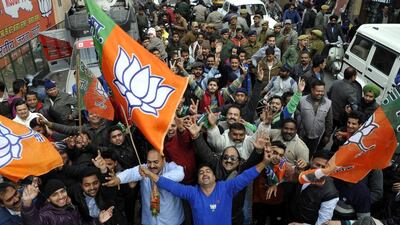NEW DELHI // Continuing its electoral streak this year, the Bharatiya Janata Party emerged as the second-biggest party in the Jammu and Kashmir legislature and retained its dominance in Jharkhand in eastern India.
The results of both state elections – which were held in five phases over the past month – were announced on Tuesday.
After winning national elections this summer and state elections in Haryana and Maharashtra, the BJP was aiming to win 44 seats in Jammu & Kashmir’s 87-seat assembly.
It was an ambitious target for a party founded on a Hindu nationalist ideology in India’s only Muslim-majority state. The BJP won only 11 seats in the previous election in 2008, and has never formed the government in the state.
In the event, the BJP won 25 seats, second only to the People’s Democratic Party (PDP), which won 28. The Congress, India’s oldest party, won 12 seats, according to the election commission, while the National Conference – which formed the previous government with the Congress – won 15.
As the party with the most seats, the PDP will be asked to form the government, but it will need other parties to give it majority support.
“We will take our time to think about alliances,” said Mehbooba Mufti, the PDP president. “The priority is not to cobble up a government. We will do what is best for the people of Jammu and Kashmir.”
Ms Mufti did not indicate which party the PDP was in discussions with. A partnership with the BJP would provide an outright majority, whereas a tie-up with either the Congress or the National Conference would require it to seek out independents and smaller parties to make up the numbers.
Significantly, the BJP won all its seats in the Jammu region, where Hindus form the majority and which accounts for 46 seats in the legislature. The party failed to win any seats in the Muslim-majority Kashmir Valley, which has been the subject of three wars between India and Pakistan, in the 2008 election as well.
The BJP has long espoused an inflexible approach to Jammu and Kashmir, advocating the use of military force in response to the valley’s separatist movements and seeking the repeal of Article 370 of the Constitution, which grants some autonomy to the state government.
According to this article, the federal government needs the state government’s permission to apply any laws to the people of Jammu and Kashmir that do not pertain to defence, foreign affairs, finance and communication.
In Jharkhand, where the BJP has been dominant since the state was created in 2000, the party won 37 out of 81 seats – just short of an absolute majority. But its alliance with the All Jharkhand Students Union, which won five seats, puts it in a comfortable position to form the next government.
ssubramanian@thenational.ae

